中考满分——第4讲 代词和连词
图片预览
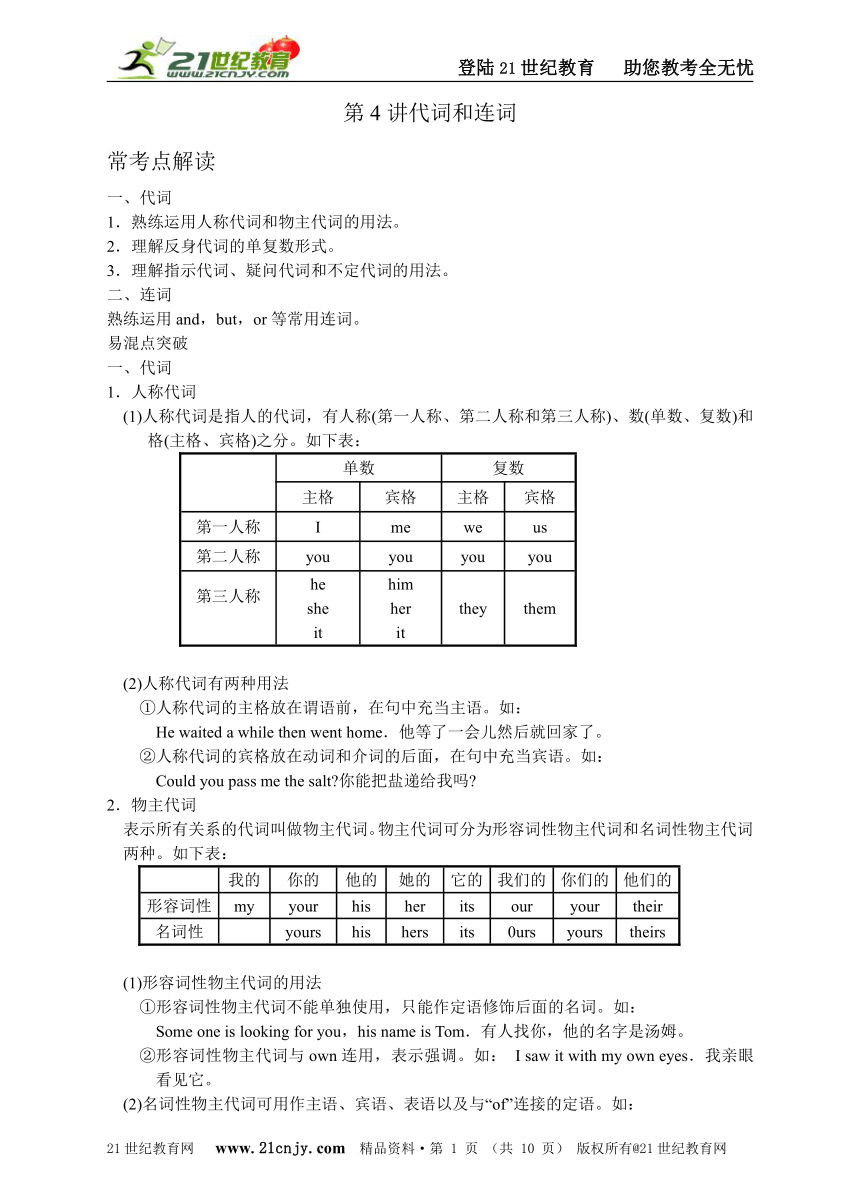
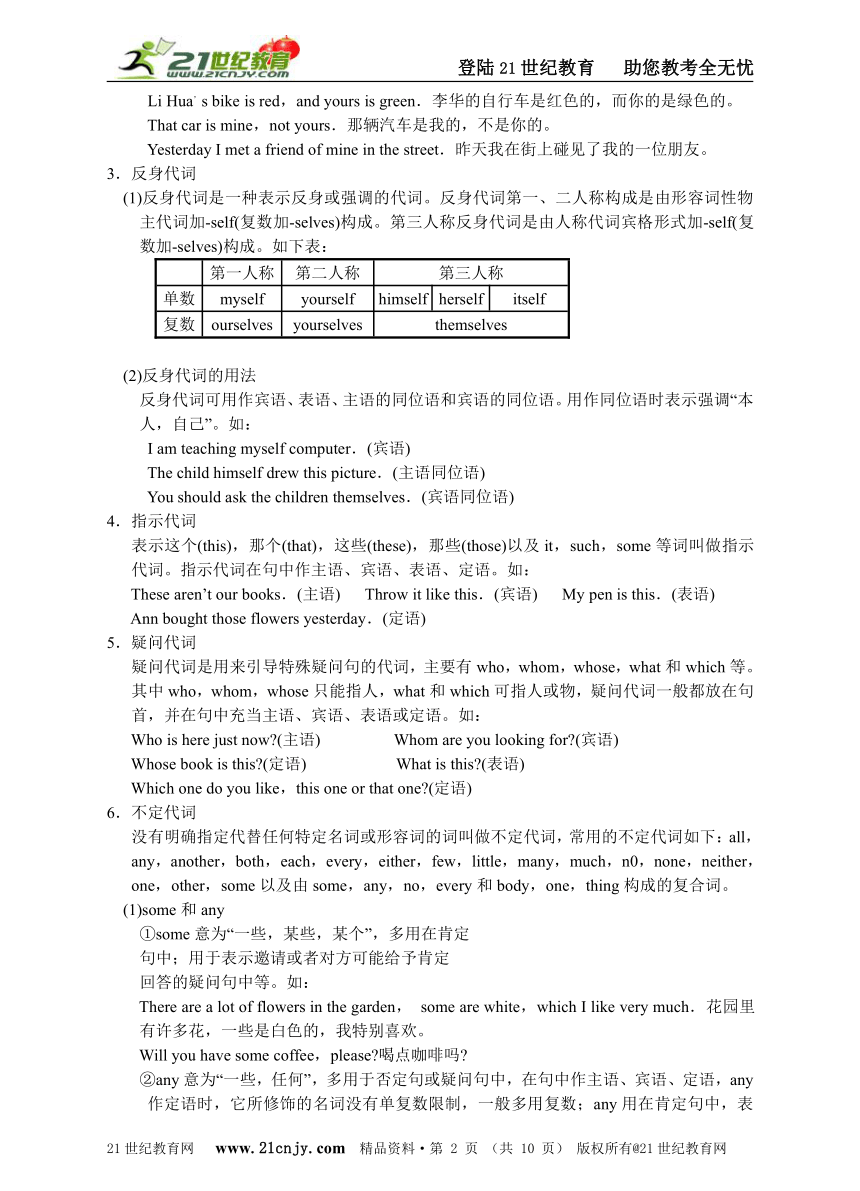
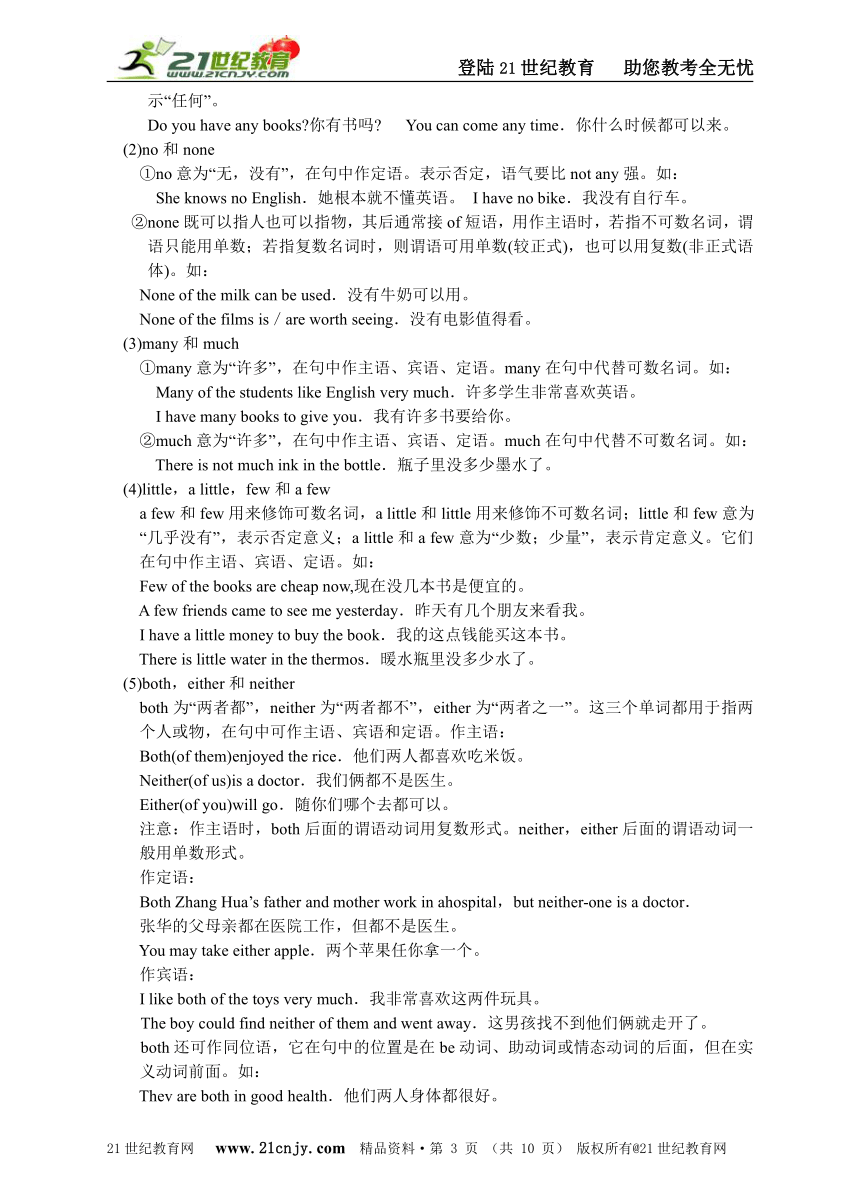
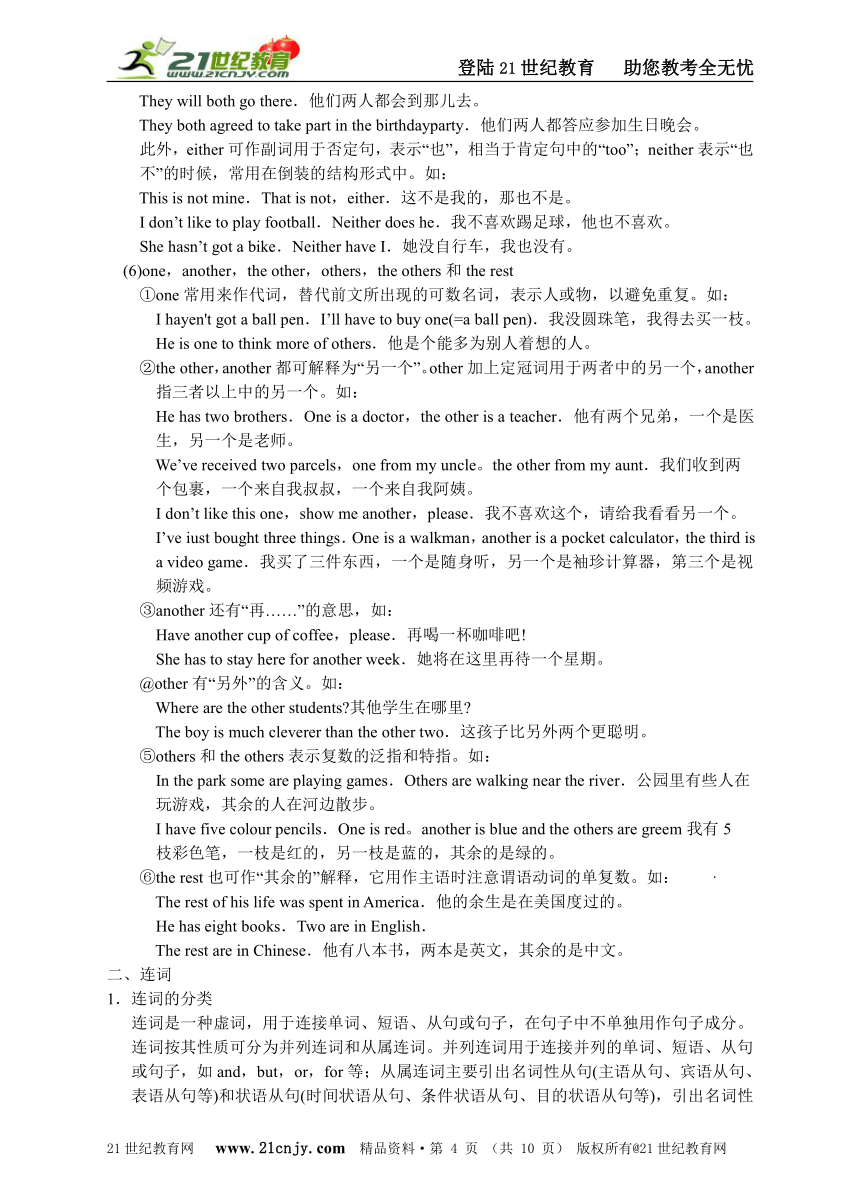
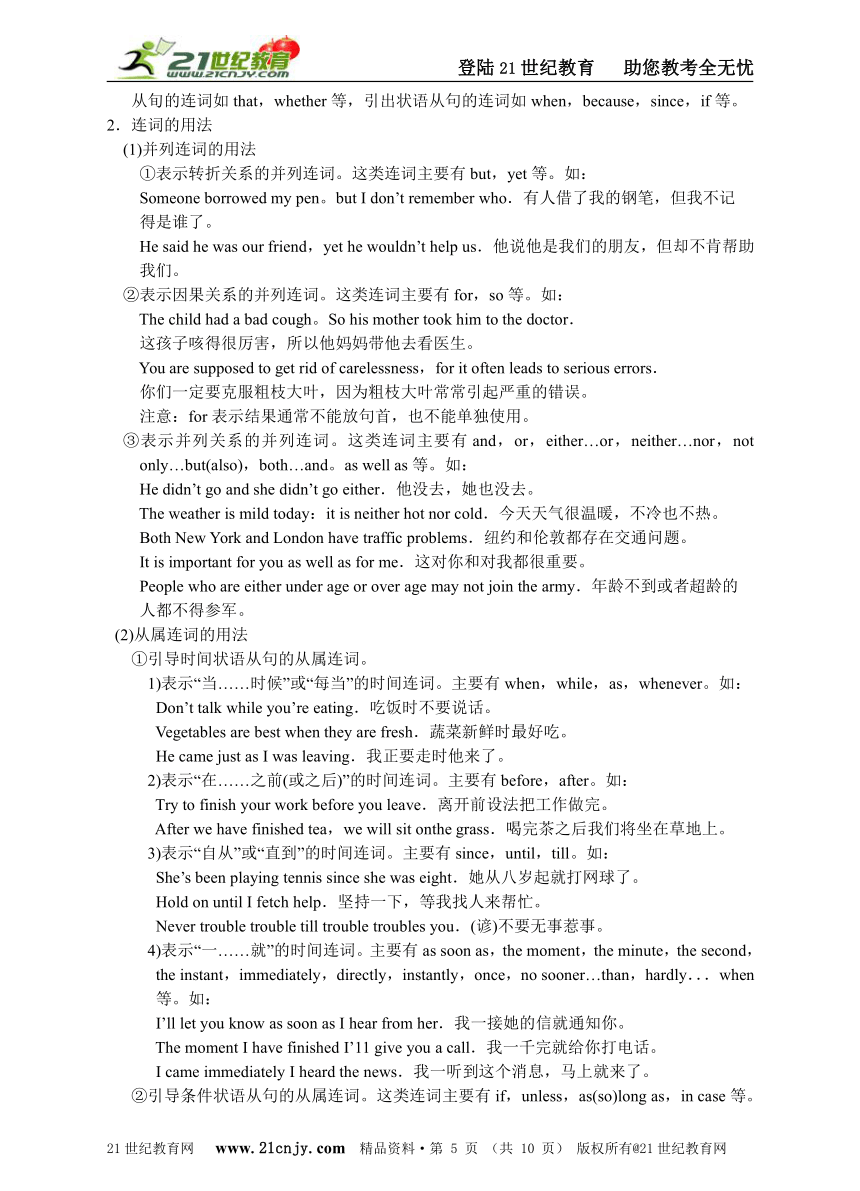
文档简介
第4讲代词和连词
常考点解读
一、代词
1.熟练运用人称代词和物主代词的用法。
2.理解反身代词的单复数形式。
3.理解指示代词、疑问代词和不定代词的用法。
二、连词
熟练运用and,but,or等常用连词。
易混点突破
一、代词
1.人称代词
(1)人称代词是指人的代词,有人称(第一人称、第二人称和第三人称)、数(单数、复数)和格(主格、宾格)之分。如下表:
单数
复数
主格
宾格
主格
宾格
第一人称
I
me
we
us
第二人称
you
you
you
you
第三人称
he
she
it
him
her
it
they
them
(2)人称代词有两种用法
①人称代词的主格放在谓语前,在句中充当主语。如:
He waited a while then went home.他等了一会儿然后就回家了。
②人称代词的宾格放在动词和介词的后面,在句中充当宾语。如:
Could you pass me the salt?你能把盐递给我吗?
2.物主代词
表示所有关系的代词叫做物主代词。物主代词可分为形容词性物主代词和名词性物主代词两种。如下表:
我的
你的
他的
她的
它的
我们的
你们的
他们的
形容词性
my
your
his
her
its
our
your
their
名词性
yours
his
hers
its
0urs
yours
theirs
(1)形容词性物主代词的用法
①形容词性物主代词不能单独使用,只能作定语修饰后面的名词。如:
Some one is looking for you,his name is Tom.有人找你,他的名字是汤姆。
②形容词性物主代词与own连用,表示强调。如: I saw it with my own eyes.我亲眼看见它。
(2)名词性物主代词可用作主语、宾语、表语以及与“of”连接的定语。如:
Li Hua,s bike is red,and yours is green.李华的自行车是红色的,而你的是绿色的。
That car is mine,not yours.那辆汽车是我的,不是你的。
Yesterday I met a friend of mine in the street.昨天我在街上碰见了我的一位朋友。
3.反身代词
(1)反身代词是一种表示反身或强调的代词。反身代词第一、二人称构成是由形容词性物主代词加-self(复数加-selves)构成。第三人称反身代词是由人称代词宾格形式加-self(复数加-selves)构成。如下表:
第一人称
第二人称
第三人称
单数
myself
yourself
himself
herself
itself
复数
ourselves
yourselves
themselves
(2)反身代词的用法
反身代词可用作宾语、表语、主语的同位语和宾语的同位语。用作同位语时表示强调“本人,自己”。如:
I am teaching myself computer.(宾语)
The child himself drew this picture.(主语同位语)
You should ask the children themselves.(宾语同位语)
4.指示代词
表示这个(this),那个(that),这些(these),那些(those)以及it,such,some等词叫做指示代词。指示代词在句中作主语、宾语、表语、定语。如:
These aren’t our books.(主语) Throw it like this.(宾语) My pen is this.(表语)
Ann bought those flowers yesterday.(定语)
5.疑问代词
疑问代词是用来引导特殊疑问句的代词,主要有who,whom,whose,what和which等。其中who,whom,whose只能指人,what和which可指人或物,疑问代词一般都放在句首,并在句中充当主语、宾语、表语或定语。如:
Who is here just now?(主语) Whom are you looking for?(宾语)
Whose book is this?(定语) What is this?(表语)
Which one do you like,this one or that one?(定语)
6.不定代词
没有明确指定代替任何特定名词或形容词的词叫做不定代词,常用的不定代词如下:all,any,another,both,each,every,either,few,little,many,much,n0,none,neither,one,other,some以及由some,any,no,every和body,one,thing构成的复合词。
(1)some和any
①some意为“一些,某些,某个”,多用在肯定
句中;用于表示邀请或者对方可能给予肯定
回答的疑问句中等。如:
There are a lot of flowers in the garden, some are white,which I like very much.花园里有许多花,一些是白色的,我特别喜欢。
Will you have some coffee,please?喝点咖啡吗?
②any意为“一些,任何”,多用于否定句或疑问句中,在句中作主语、宾语、定语,any作定语时,它所修饰的名词没有单复数限制,一般多用复数;any用在肯定句中,表示“任何”。
Do you have any books?你有书吗? You can come any time.你什么时候都可以来。
(2)no和none
①no意为“无,没有”,在句中作定语。表示否定,语气要比not any强。如:
She knows no English.她根本就不懂英语。 I have no bike.我没有自行车。
②none既可以指人也可以指物,其后通常接of短语,用作主语时,若指不可数名词,谓语只能用单数;若指复数名词时,则谓语可用单数(较正式),也可以用复数(非正式语体)。如:
None of the milk can be used.没有牛奶可以用。
None of the films is/are worth seeing.没有电影值得看。
(3)many和much
①many意为“许多”,在句中作主语、宾语、定语。many在句中代替可数名词。如:
Many of the students like English very much.许多学生非常喜欢英语。
I have many books to give you.我有许多书要给你。
②much意为“许多”,在句中作主语、宾语、定语。much在句中代替不可数名词。如:
There is not much ink in the bottle.瓶子里没多少墨水了。
(4)little,a little,few和a few
a few和few用来修饰可数名词,a little和little用来修饰不可数名词;little和few意为“几乎没有”,表示否定意义;a little和a few意为“少数;少量”,表示肯定意义。它们在句中作主语、宾语、定语。如:
Few of the books are cheap now,现在没几本书是便宜的。
A few friends came to see me yesterday.昨天有几个朋友来看我。
I have a little money to buy the book.我的这点钱能买这本书。
There is little water in the thermos.暖水瓶里没多少水了。
(5)both,either和neither
both为“两者都”,neither为“两者都不”,either为“两者之一”。这三个单词都用于指两个人或物,在句中可作主语、宾语和定语。作主语:
Both(of them)enjoyed the rice.他们两人都喜欢吃米饭。
Neither(of us)is a doctor.我们俩都不是医生。
Either(of you)will go.随你们哪个去都可以。
注意:作主语时,both后面的谓语动词用复数形式。neither,either后面的谓语动词一般用单数形式。
作定语:
Both Zhang Hua’s father and mother work in ahospital,but neither-one is a doctor.
张华的父母亲都在医院工作,但都不是医生。
You may take either apple.两个苹果任你拿一个。
作宾语:
I like both of the toys very much.我非常喜欢这两件玩具。
The boy could find neither of them and went away.这男孩找不到他们俩就走开了。
both还可作同位语,它在句中的位置是在be动词、助动词或情态动词的后面,但在实义动词前面。如:
Thev are both in good health.他们两人身体都很好。
They will both go there.他们两人都会到那儿去。
They both agreed to take part in the birthdayparty.他们两人都答应参加生日晚会。
此外,either可作副词用于否定句,表示“也”,相当于肯定句中的“too”;neither表示“也不”的时候,常用在倒装的结构形式中。如:
This is not mine.That is not,either.这不是我的,那也不是。
I don’t like to play football.Neither does he.我不喜欢踢足球,他也不喜欢。
She hasn’t got a bike.Neither have I.她没自行车,我也没有。
(6)one,another,the other,others,the others和the rest
①one常用来作代词,替代前文所出现的可数名词,表示人或物,以避免重复。如:
I hayen't got a ball pen.I’ll have to buy one(=a ball pen).我没圆珠笔,我得去买一枝。
He is one to think more of others.他是个能多为别人着想的人。
②the other,another都可解释为“另一个”。other加上定冠词用于两者中的另一个,another指三者以上中的另一个。如:
He has two brothers.One is a doctor,the other is a teacher.他有两个兄弟,一个是医生,另一个是老师。
We’ve received two parcels,one from my uncle。the other from my aunt.我们收到两
个包裹,一个来自我叔叔,一个来自我阿姨。
I don’t like this one,show me another,please.我不喜欢这个,请给我看看另一个。
I’ve iust bought three things.One is a walkman,another is a pocket calculator,the third is a video game.我买了三件东西,一个是随身听,另一个是袖珍计算器,第三个是视频游戏。
③another还有“再……”的意思,如:
Have another cup of coffee,please.再喝一杯咖啡吧!
She has to stay here for another week.她将在这里再待一个星期。
@other有“另外”的含义。如:
Where are the other students?其他学生在哪里?
The boy is much cleverer than the other two.这孩子比另外两个更聪明。
⑤others和the others表示复数的泛指和特指。如:
In the park some are playing games.Others are walking near the river.公园里有些人在
玩游戏,其余的人在河边散步。
I have five colour pencils.One is red。another is blue and the others are greem我有5
枝彩色笔,一枝是红的,另一枝是蓝的,其余的是绿的。
⑥the rest也可作“其余的”解释,它用作主语时注意谓语动词的单复数。如: ·
The rest of his life was spent in America.他的余生是在美国度过的。
He has eight books.Two are in English.
The rest are in Chinese.他有八本书,两本是英文,其余的是中文。
二、连词
1.连词的分类
连词是一种虚词,用于连接单词、短语、从句或句子,在句子中不单独用作句子成分。连词按其性质可分为并列连词和从属连词。并列连词用于连接并列的单词、短语、从句或句子,如and,but,or,for等;从属连词主要引出名词性从句(主语从句、宾语从句、表语从句等)和状语从句(时间状语从句、条件状语从句、目的状语从句等),引出名词性从旬的连词如that,whether等,引出状语从句的连词如when,because,since,if等。
2.连词的用法
(1)并列连词的用法
①表示转折关系的并列连词。这类连词主要有but,yet等。如:
Someone borrowed my pen。but I don’t remember who.有人借了我的钢笔,但我不记
得是谁了。
He said he was our friend,yet he wouldn’t help us.他说他是我们的朋友,但却不肯帮助我们。
②表示因果关系的并列连词。这类连词主要有for,so等。如:
The child had a bad cough。So his mother took him to the doctor.
这孩子咳得很厉害,所以他妈妈带他去看医生。
You are supposed to get rid of carelessness,for it often leads to serious errors.
你们一定要克服粗枝大叶,因为粗枝大叶常常引起严重的错误。
注意:for表示结果通常不能放句首,也不能单独使用。
③表示并列关系的并列连词。这类连词主要有and,or,either…or,neither…nor,not only…but(also),both…and。as well as等。如:
He didn’t go and she didn’t go either.他没去,她也没去。
The weather is mild today:it is neither hot nor cold.今天天气很温暖,不冷也不热。
Both New York and London have traffic problems.纽约和伦敦都存在交通问题。
It is important for you as well as for me.这对你和对我都很重要。
People who are either under age or over age may not join the army.年龄不到或者超龄的
人都不得参军。
(2)从属连词的用法
①引导时间状语从句的从属连词。
1)表示“当……时候”或“每当”的时间连词。主要有when,while,as,whenever。如:
Don’t talk while you’re eating.吃饭时不要说话。
Vegetables are best when they are fresh.蔬菜新鲜时最好吃。
He came just as I was leaving.我正要走时他来了。
2)表示“在……之前(或之后)”的时间连词。主要有before,after。如:
Try to finish your work before you leave.离开前设法把工作做完。
After we have finished tea,we will sit onthe grass.喝完茶之后我们将坐在草地上。
3)表示“自从”或“直到”的时间连词。主要有since,until,till。如:
She’s been playing tennis since she was eight.她从八岁起就打网球了。
Hold on until I fetch help.坚持一下,等我找人来帮忙。
Never trouble trouble till trouble troubles you.(谚)不要无事惹事。
4)表示“一……就”的时间连词。主要有as soon as,the moment,the minute,the second,the instant,immediately,directly,instantly,once,no sooner…than,hardly...when等。如:
I’ll let you know as soon as I hear from her.我一接她的信就通知你。
The moment I have finished I’11 give you a call.我一千完就给你打电话。
I came immediately I heard the news.我一听到这个消息,马上就来了。
②引导条件状语从句的从属连词。这类连词主要有if,unless,as(so)long as,in case等。如:
Do you mind if I open the window?我开窗你不介意吧?
Don't come unless I telephone.除非我打电话,否则你别来。
As long as you’re happy,it doesn’t matter what you do.只要你高兴,你做什么都没关系。
注意:在条件状语从句中,通常要用一般现在时表示将来意义,而不能直接使用将来时态。不过,有时表示条件的if之后可能用will,但那不是将来时态,而是表示意愿或委婉的请求(will为情态动词)。如:
If you will sit down for a few moments,I’ll tell the manager you’re here.请稍坐,我这就通知经理说您来了。
③引导目的状语从句的从属连词。主要有in order that,so…that等。如:
He raised his voice so that everyone could hear.他提高了嗓音,以便每个人都能听见。
④引导结果状语从句的从属连词。主要有so that。so…that,such…that等。如:
I went to the lecture early so that I got a good seat.我去听演讲去得很早,所以找个好座位。
I had so many falls that l was black and blue all over.我摔了许多跤,以致于全身都是青一块紫一块的。
⑤引导原因状语从句的从属连词。‘主要有because,as,since,如:
He distrusted me because I was new.他不信任我,因为我是新来的。
As you are sorry,I’ll forgive you.既然你悔悟了,我就原谅你。
Since we've no money,we can’t buy it. 由于我们没钱,我们无法购买它。
⑥引导让步状语从句的从属连词。主要有although,though,even though,even if,
while。however,whatever,whoever,whenever,wherever等。如:
Although they are twins,they look entirely different.他们虽是孪生,但是相貌却完全
不同。
I like her even though she can be annoying.尽管她有时很恼人,但我还是喜欢她。
You won't move that stone,however strong you are.不管你力气多大,也休想搬动那块石头。
Whatever we have achieved,we owe to your support.我们取得的一切成就都归功于你们
的支持。
Whoever you are,you can’t pass this way.不管你是谁,你都不能从这里通过。
Whenever I see him I speak to him每当我见到他,我都和他讲话。
⑦引导方式状语从句的从属连词。主要有as,as if,as though等。如:
Why didn't you catch the last bus as I told you to?你怎么不听我的话赶乘末班公共汽车呢?
He bent the iron bar as if it had been made of rubbe r.他将铁棍折弯,仿佛那是用橡皮做成的。
⑧引导地点状语从句的从属连词。主要有where,wherever,everywhere,anywhere等。如:
The church was built where there had once been a Roman temple.
这座教堂盖在一座罗马寺庙的旧址上。
I’ll take you anywhere you like.你想到哪儿我就带你到哪儿。
Everywhere I go,I find the same thing.不管我走到哪里,我都发现同样情况。
⑨引导比较状语从句的从属连词。主要确than和as…as。如:
She was now happier than she had ever been.现在她比过去任何时候都快活。
I glanced at my watch.It was earlier thanthought.我看了看表,时间比我想像的早。
He doesn’t work as hard as she does.他工作不像她那样努力。
真题剖析
真题1 (2011·佛山)Parents care about children’s education more than anything else.
A.their B.them C.theirs
解析:本题考查代词。名词前面用名词性物主代词。
答案:A
真题2 (2011·聊城) —How do you like the story?—Interesting, the end of it is not perfeet.
A.so B.though C.or D.because
解析:本题考查连词的用法。so意为“因此”;though意为“虽然,尽管”;or意为“否则,或者”.because意为“因为”。句意:一你觉得这个故事怎样?一有趣,尽管结尾不是完美的。
答案:B
真题3 (2011·内江)I like the MP3, it’s too expensive.
A.but B.so C.and
解析:本题考查连词的用法。but意为“但是”,
表转折;so意为“因此”,表结果;and意为“又,而”,袁并列或承接。句意:我喜欢这部MP3,但是它太昂贵了.
答案:A
真题4 (2011·贺州) —Is that schoolbag? —No. is white.
A.his;His B.her:His C.he;His D.her:Her
解析:本题考查代词辨析。根据句意:—这是他的书包吗? —不,他的是白色的。形容词性物主代词在句中作定语。答句中需要主语,所以需要名词性物主代词。he的形容词性物主代词与名词性物主代词都为his。
答案:A
真题5 (2011·宿迁)we have two foneign teachers here.One is from England,and is from America.
A.another B.the other C.other D.the others
解析:本题考查one…the other…的用法。使用one…the other…时,我们通常是针对两者而言的。即指“两者中的一个……,另一个……”。句意:我们有两个外国老师,一个来自英国,另一个来自美国。
答案:B
名师预测
( )1.—How about having a picnic with me? —I’d love to, I’m afraid I have no time.
A.so B and C but D.or
( )2.Keep off the drugs(毒品), you and your family will be in great danger.
A.and B.or C.but D.so
( )3. is impossible if you put your heart into it.
A.Anything B.Something C.Everything D.Nothing
( )4.一Wow!What a lovely e-dog!Is it yours? --Yes,it's .My father bought it
for me yesterday.
A.my B.yours C.mine D.your
( )5.Making friends is not easy.Sometimes it can take years you become true
friends with someone.
A.before B.after C.because D.unless
同步训练26代词和连词
一、单项选择
( )1.(2011·泉州)This is my sweater.Where’s ?
A.you B.yours C.your D.yourself
( )2.(2011·桂林)This is MP4.Yours is over there.
A.my B.me C.I D.mine
( )3.(2011·宜宾)I have two brothers.One is a teacher, is a doctor.
A.another B.other C.others D.the other
( )4.(2011·天津) -Is this ruler?-No. is over there.
A.her;Her B.her;Hers C.hers;Hers D.hers;Her
( )5.(2011·崇左)I feel my stomach terrible.I think I ate at lunch time.
A.something bad B.something good
C.bad something D.good something
( )6.(2011·贵港) -What do you think of the two backpacks?- of them are very nice.
A.Either B.Both C.Each D.An
( )7.(2011·菏泽)We can easily become unhappy we work out our problems in our daily lire.
A.after B.if C.until D.unless
( )8.(2011·滨州) -What was your brother doing at this time yesterday?
-He was reading a magazine I was writing an e-mail at home.
A.as soon as B.after C.until D.while
( )9.(2011·杭州)I really enjoyed your lecture, there were some parts I didn’t quite
understand.
A because B.unless C.though D.after
( )10.(2011·杭州)It’s too Iate to invite any more people. ,you know how Tim hates partms.
A.Besides B.However C.Still D.Instead
( )11.(2011·乐山) -Will you come over for dinner on Monday or Tuesday?-I’m afraid
day is OK.I’ll fly to Paris on holiday for the whole week.
A.neither B.either C.both
( )12.(2011·台州) -How did your uncle learn to play the guitar?-By .
A.myself B.yourself C.herself D.himself
( )13.(2011·潍坊)The banana pie tastes delicious.Could I!lave another .
A.one B.it C.this D.that
( )14.(2011·内江)Work hard at English is difficult if you put your heart into it.
A.Anything B.Something C.Nothing D.Everything
( )15.(2011·青岛)Harry Potter is so interesting a book that lots of teenagers like to read
A.it B.this C.that D.one
( )16.(2011·泉州)You should finish your lessons you go to play.
A.while B.as C.before D.when
( )17.(2011·南宁.)Please hurry up, you’ll be late for school.
A.but B.and C.or, D.so
( )18.(2011·丽水) -I can stay and help you you like. -So nice of you,Bill.
A.until B.though C.if D.and
( )19.(2011·青岛) -I suggest buying her a Teddy Bear for her birthday.-
someone else brings the same present?
A.1f B.What C.What if D.How about
( )20.(2011·资阳)You have coughed for several days,Bill.Stop smoking, you’ll
get better soon.
A.but B.after C.or D.and
( )21.(2011·济宁)Most students think they should have time and energy’to develop their own interests.
A.few B.less C.little D.more
( )22.(2011·北京)I’m talking to you,Jack.lease listen to carefully.
A.me B.mine C.you D.yours
( )23.(2011·宜宾)He didn’t go to school yesterday he was ill
A.because B.becftuse of C.if D.so
( )24.(2011·武汉) -Where is Leo?He said he would come tonight!-Yes.he say so, we can’t find him now.
A.and B.so C.but D.or
( )25.(2011·芜湖) -Do you like sports?-Yes,I do some running in the park everyday
the weather is terrible.
A.if B.after C.unless D.while
( )26.(2011·南宁)My friend Tom comes from Canada and is a tall boy with blue eyes·
A.he B.his C.she D.it
( )27.(201 1·连云港) -Oh.the traffic is so heavy.-Let’s change route to the airport.
A.other B.others C.the other D.another
( )28.(2011·莆田) -Doyou know Li Na?-Of course.She’’a great tennis player
comes from Hubei,China.
A.who B.what C.which D.that
( )29.(2011·呼和浩特) -Are Mr.and Mrs.Wang living alone in the house?-Yes,although they have three sons, of them live with their parents.
A.neither B.both C.all D.none
( )30.(2011·菏泽) you do,don’t miss this exhibition,for it’s so hard for me to get
the tickets.
A.Whatever B.However C.Whenever D.Whether
二、用所给词的适当形式填空
1.The children enjoyed (them)at the party last night.
2. (where)you go,you should follow the Party.
3.-Bob,is this your dictionary?-No,it isn’t.Ask Sally.She is looking for (her).
4.Does (someone)know the answer to the question?
5.- Alice,is this your dictionary?-Let me see.Oh,no. (my)is in my bag.
6.-Where did you go for your winter vacation?-My family went to Paris. (us)had a great time.
7.- (Who)bike is this? -I think it’s Peter’s.
8.-Tomorrow is David’s tenth birthday.-Yes.Let’s give (he)a CD.He likes music.
答案
【名师预测】
1—5 CBDCA
【同步训练26】
一、1—5 BADBA 6—10 BDDCA 11—15 ADACA
16—20 CCCCD 21—25 DAACC 26—30 ADADA
二、1.themselves 2.Wherever 3.hers 4.anyone 5.Mine 6.We 7.Whose 8.him
常考点解读
一、代词
1.熟练运用人称代词和物主代词的用法。
2.理解反身代词的单复数形式。
3.理解指示代词、疑问代词和不定代词的用法。
二、连词
熟练运用and,but,or等常用连词。
易混点突破
一、代词
1.人称代词
(1)人称代词是指人的代词,有人称(第一人称、第二人称和第三人称)、数(单数、复数)和格(主格、宾格)之分。如下表:
单数
复数
主格
宾格
主格
宾格
第一人称
I
me
we
us
第二人称
you
you
you
you
第三人称
he
she
it
him
her
it
they
them
(2)人称代词有两种用法
①人称代词的主格放在谓语前,在句中充当主语。如:
He waited a while then went home.他等了一会儿然后就回家了。
②人称代词的宾格放在动词和介词的后面,在句中充当宾语。如:
Could you pass me the salt?你能把盐递给我吗?
2.物主代词
表示所有关系的代词叫做物主代词。物主代词可分为形容词性物主代词和名词性物主代词两种。如下表:
我的
你的
他的
她的
它的
我们的
你们的
他们的
形容词性
my
your
his
her
its
our
your
their
名词性
yours
his
hers
its
0urs
yours
theirs
(1)形容词性物主代词的用法
①形容词性物主代词不能单独使用,只能作定语修饰后面的名词。如:
Some one is looking for you,his name is Tom.有人找你,他的名字是汤姆。
②形容词性物主代词与own连用,表示强调。如: I saw it with my own eyes.我亲眼看见它。
(2)名词性物主代词可用作主语、宾语、表语以及与“of”连接的定语。如:
Li Hua,s bike is red,and yours is green.李华的自行车是红色的,而你的是绿色的。
That car is mine,not yours.那辆汽车是我的,不是你的。
Yesterday I met a friend of mine in the street.昨天我在街上碰见了我的一位朋友。
3.反身代词
(1)反身代词是一种表示反身或强调的代词。反身代词第一、二人称构成是由形容词性物主代词加-self(复数加-selves)构成。第三人称反身代词是由人称代词宾格形式加-self(复数加-selves)构成。如下表:
第一人称
第二人称
第三人称
单数
myself
yourself
himself
herself
itself
复数
ourselves
yourselves
themselves
(2)反身代词的用法
反身代词可用作宾语、表语、主语的同位语和宾语的同位语。用作同位语时表示强调“本人,自己”。如:
I am teaching myself computer.(宾语)
The child himself drew this picture.(主语同位语)
You should ask the children themselves.(宾语同位语)
4.指示代词
表示这个(this),那个(that),这些(these),那些(those)以及it,such,some等词叫做指示代词。指示代词在句中作主语、宾语、表语、定语。如:
These aren’t our books.(主语) Throw it like this.(宾语) My pen is this.(表语)
Ann bought those flowers yesterday.(定语)
5.疑问代词
疑问代词是用来引导特殊疑问句的代词,主要有who,whom,whose,what和which等。其中who,whom,whose只能指人,what和which可指人或物,疑问代词一般都放在句首,并在句中充当主语、宾语、表语或定语。如:
Who is here just now?(主语) Whom are you looking for?(宾语)
Whose book is this?(定语) What is this?(表语)
Which one do you like,this one or that one?(定语)
6.不定代词
没有明确指定代替任何特定名词或形容词的词叫做不定代词,常用的不定代词如下:all,any,another,both,each,every,either,few,little,many,much,n0,none,neither,one,other,some以及由some,any,no,every和body,one,thing构成的复合词。
(1)some和any
①some意为“一些,某些,某个”,多用在肯定
句中;用于表示邀请或者对方可能给予肯定
回答的疑问句中等。如:
There are a lot of flowers in the garden, some are white,which I like very much.花园里有许多花,一些是白色的,我特别喜欢。
Will you have some coffee,please?喝点咖啡吗?
②any意为“一些,任何”,多用于否定句或疑问句中,在句中作主语、宾语、定语,any作定语时,它所修饰的名词没有单复数限制,一般多用复数;any用在肯定句中,表示“任何”。
Do you have any books?你有书吗? You can come any time.你什么时候都可以来。
(2)no和none
①no意为“无,没有”,在句中作定语。表示否定,语气要比not any强。如:
She knows no English.她根本就不懂英语。 I have no bike.我没有自行车。
②none既可以指人也可以指物,其后通常接of短语,用作主语时,若指不可数名词,谓语只能用单数;若指复数名词时,则谓语可用单数(较正式),也可以用复数(非正式语体)。如:
None of the milk can be used.没有牛奶可以用。
None of the films is/are worth seeing.没有电影值得看。
(3)many和much
①many意为“许多”,在句中作主语、宾语、定语。many在句中代替可数名词。如:
Many of the students like English very much.许多学生非常喜欢英语。
I have many books to give you.我有许多书要给你。
②much意为“许多”,在句中作主语、宾语、定语。much在句中代替不可数名词。如:
There is not much ink in the bottle.瓶子里没多少墨水了。
(4)little,a little,few和a few
a few和few用来修饰可数名词,a little和little用来修饰不可数名词;little和few意为“几乎没有”,表示否定意义;a little和a few意为“少数;少量”,表示肯定意义。它们在句中作主语、宾语、定语。如:
Few of the books are cheap now,现在没几本书是便宜的。
A few friends came to see me yesterday.昨天有几个朋友来看我。
I have a little money to buy the book.我的这点钱能买这本书。
There is little water in the thermos.暖水瓶里没多少水了。
(5)both,either和neither
both为“两者都”,neither为“两者都不”,either为“两者之一”。这三个单词都用于指两个人或物,在句中可作主语、宾语和定语。作主语:
Both(of them)enjoyed the rice.他们两人都喜欢吃米饭。
Neither(of us)is a doctor.我们俩都不是医生。
Either(of you)will go.随你们哪个去都可以。
注意:作主语时,both后面的谓语动词用复数形式。neither,either后面的谓语动词一般用单数形式。
作定语:
Both Zhang Hua’s father and mother work in ahospital,but neither-one is a doctor.
张华的父母亲都在医院工作,但都不是医生。
You may take either apple.两个苹果任你拿一个。
作宾语:
I like both of the toys very much.我非常喜欢这两件玩具。
The boy could find neither of them and went away.这男孩找不到他们俩就走开了。
both还可作同位语,它在句中的位置是在be动词、助动词或情态动词的后面,但在实义动词前面。如:
Thev are both in good health.他们两人身体都很好。
They will both go there.他们两人都会到那儿去。
They both agreed to take part in the birthdayparty.他们两人都答应参加生日晚会。
此外,either可作副词用于否定句,表示“也”,相当于肯定句中的“too”;neither表示“也不”的时候,常用在倒装的结构形式中。如:
This is not mine.That is not,either.这不是我的,那也不是。
I don’t like to play football.Neither does he.我不喜欢踢足球,他也不喜欢。
She hasn’t got a bike.Neither have I.她没自行车,我也没有。
(6)one,another,the other,others,the others和the rest
①one常用来作代词,替代前文所出现的可数名词,表示人或物,以避免重复。如:
I hayen't got a ball pen.I’ll have to buy one(=a ball pen).我没圆珠笔,我得去买一枝。
He is one to think more of others.他是个能多为别人着想的人。
②the other,another都可解释为“另一个”。other加上定冠词用于两者中的另一个,another指三者以上中的另一个。如:
He has two brothers.One is a doctor,the other is a teacher.他有两个兄弟,一个是医生,另一个是老师。
We’ve received two parcels,one from my uncle。the other from my aunt.我们收到两
个包裹,一个来自我叔叔,一个来自我阿姨。
I don’t like this one,show me another,please.我不喜欢这个,请给我看看另一个。
I’ve iust bought three things.One is a walkman,another is a pocket calculator,the third is a video game.我买了三件东西,一个是随身听,另一个是袖珍计算器,第三个是视频游戏。
③another还有“再……”的意思,如:
Have another cup of coffee,please.再喝一杯咖啡吧!
She has to stay here for another week.她将在这里再待一个星期。
@other有“另外”的含义。如:
Where are the other students?其他学生在哪里?
The boy is much cleverer than the other two.这孩子比另外两个更聪明。
⑤others和the others表示复数的泛指和特指。如:
In the park some are playing games.Others are walking near the river.公园里有些人在
玩游戏,其余的人在河边散步。
I have five colour pencils.One is red。another is blue and the others are greem我有5
枝彩色笔,一枝是红的,另一枝是蓝的,其余的是绿的。
⑥the rest也可作“其余的”解释,它用作主语时注意谓语动词的单复数。如: ·
The rest of his life was spent in America.他的余生是在美国度过的。
He has eight books.Two are in English.
The rest are in Chinese.他有八本书,两本是英文,其余的是中文。
二、连词
1.连词的分类
连词是一种虚词,用于连接单词、短语、从句或句子,在句子中不单独用作句子成分。连词按其性质可分为并列连词和从属连词。并列连词用于连接并列的单词、短语、从句或句子,如and,but,or,for等;从属连词主要引出名词性从句(主语从句、宾语从句、表语从句等)和状语从句(时间状语从句、条件状语从句、目的状语从句等),引出名词性从旬的连词如that,whether等,引出状语从句的连词如when,because,since,if等。
2.连词的用法
(1)并列连词的用法
①表示转折关系的并列连词。这类连词主要有but,yet等。如:
Someone borrowed my pen。but I don’t remember who.有人借了我的钢笔,但我不记
得是谁了。
He said he was our friend,yet he wouldn’t help us.他说他是我们的朋友,但却不肯帮助我们。
②表示因果关系的并列连词。这类连词主要有for,so等。如:
The child had a bad cough。So his mother took him to the doctor.
这孩子咳得很厉害,所以他妈妈带他去看医生。
You are supposed to get rid of carelessness,for it often leads to serious errors.
你们一定要克服粗枝大叶,因为粗枝大叶常常引起严重的错误。
注意:for表示结果通常不能放句首,也不能单独使用。
③表示并列关系的并列连词。这类连词主要有and,or,either…or,neither…nor,not only…but(also),both…and。as well as等。如:
He didn’t go and she didn’t go either.他没去,她也没去。
The weather is mild today:it is neither hot nor cold.今天天气很温暖,不冷也不热。
Both New York and London have traffic problems.纽约和伦敦都存在交通问题。
It is important for you as well as for me.这对你和对我都很重要。
People who are either under age or over age may not join the army.年龄不到或者超龄的
人都不得参军。
(2)从属连词的用法
①引导时间状语从句的从属连词。
1)表示“当……时候”或“每当”的时间连词。主要有when,while,as,whenever。如:
Don’t talk while you’re eating.吃饭时不要说话。
Vegetables are best when they are fresh.蔬菜新鲜时最好吃。
He came just as I was leaving.我正要走时他来了。
2)表示“在……之前(或之后)”的时间连词。主要有before,after。如:
Try to finish your work before you leave.离开前设法把工作做完。
After we have finished tea,we will sit onthe grass.喝完茶之后我们将坐在草地上。
3)表示“自从”或“直到”的时间连词。主要有since,until,till。如:
She’s been playing tennis since she was eight.她从八岁起就打网球了。
Hold on until I fetch help.坚持一下,等我找人来帮忙。
Never trouble trouble till trouble troubles you.(谚)不要无事惹事。
4)表示“一……就”的时间连词。主要有as soon as,the moment,the minute,the second,the instant,immediately,directly,instantly,once,no sooner…than,hardly...when等。如:
I’ll let you know as soon as I hear from her.我一接她的信就通知你。
The moment I have finished I’11 give you a call.我一千完就给你打电话。
I came immediately I heard the news.我一听到这个消息,马上就来了。
②引导条件状语从句的从属连词。这类连词主要有if,unless,as(so)long as,in case等。如:
Do you mind if I open the window?我开窗你不介意吧?
Don't come unless I telephone.除非我打电话,否则你别来。
As long as you’re happy,it doesn’t matter what you do.只要你高兴,你做什么都没关系。
注意:在条件状语从句中,通常要用一般现在时表示将来意义,而不能直接使用将来时态。不过,有时表示条件的if之后可能用will,但那不是将来时态,而是表示意愿或委婉的请求(will为情态动词)。如:
If you will sit down for a few moments,I’ll tell the manager you’re here.请稍坐,我这就通知经理说您来了。
③引导目的状语从句的从属连词。主要有in order that,so…that等。如:
He raised his voice so that everyone could hear.他提高了嗓音,以便每个人都能听见。
④引导结果状语从句的从属连词。主要有so that。so…that,such…that等。如:
I went to the lecture early so that I got a good seat.我去听演讲去得很早,所以找个好座位。
I had so many falls that l was black and blue all over.我摔了许多跤,以致于全身都是青一块紫一块的。
⑤引导原因状语从句的从属连词。‘主要有because,as,since,如:
He distrusted me because I was new.他不信任我,因为我是新来的。
As you are sorry,I’ll forgive you.既然你悔悟了,我就原谅你。
Since we've no money,we can’t buy it. 由于我们没钱,我们无法购买它。
⑥引导让步状语从句的从属连词。主要有although,though,even though,even if,
while。however,whatever,whoever,whenever,wherever等。如:
Although they are twins,they look entirely different.他们虽是孪生,但是相貌却完全
不同。
I like her even though she can be annoying.尽管她有时很恼人,但我还是喜欢她。
You won't move that stone,however strong you are.不管你力气多大,也休想搬动那块石头。
Whatever we have achieved,we owe to your support.我们取得的一切成就都归功于你们
的支持。
Whoever you are,you can’t pass this way.不管你是谁,你都不能从这里通过。
Whenever I see him I speak to him每当我见到他,我都和他讲话。
⑦引导方式状语从句的从属连词。主要有as,as if,as though等。如:
Why didn't you catch the last bus as I told you to?你怎么不听我的话赶乘末班公共汽车呢?
He bent the iron bar as if it had been made of rubbe r.他将铁棍折弯,仿佛那是用橡皮做成的。
⑧引导地点状语从句的从属连词。主要有where,wherever,everywhere,anywhere等。如:
The church was built where there had once been a Roman temple.
这座教堂盖在一座罗马寺庙的旧址上。
I’ll take you anywhere you like.你想到哪儿我就带你到哪儿。
Everywhere I go,I find the same thing.不管我走到哪里,我都发现同样情况。
⑨引导比较状语从句的从属连词。主要确than和as…as。如:
She was now happier than she had ever been.现在她比过去任何时候都快活。
I glanced at my watch.It was earlier thanthought.我看了看表,时间比我想像的早。
He doesn’t work as hard as she does.他工作不像她那样努力。
真题剖析
真题1 (2011·佛山)Parents care about children’s education more than anything else.
A.their B.them C.theirs
解析:本题考查代词。名词前面用名词性物主代词。
答案:A
真题2 (2011·聊城) —How do you like the story?—Interesting, the end of it is not perfeet.
A.so B.though C.or D.because
解析:本题考查连词的用法。so意为“因此”;though意为“虽然,尽管”;or意为“否则,或者”.because意为“因为”。句意:一你觉得这个故事怎样?一有趣,尽管结尾不是完美的。
答案:B
真题3 (2011·内江)I like the MP3, it’s too expensive.
A.but B.so C.and
解析:本题考查连词的用法。but意为“但是”,
表转折;so意为“因此”,表结果;and意为“又,而”,袁并列或承接。句意:我喜欢这部MP3,但是它太昂贵了.
答案:A
真题4 (2011·贺州) —Is that schoolbag? —No. is white.
A.his;His B.her:His C.he;His D.her:Her
解析:本题考查代词辨析。根据句意:—这是他的书包吗? —不,他的是白色的。形容词性物主代词在句中作定语。答句中需要主语,所以需要名词性物主代词。he的形容词性物主代词与名词性物主代词都为his。
答案:A
真题5 (2011·宿迁)we have two foneign teachers here.One is from England,and is from America.
A.another B.the other C.other D.the others
解析:本题考查one…the other…的用法。使用one…the other…时,我们通常是针对两者而言的。即指“两者中的一个……,另一个……”。句意:我们有两个外国老师,一个来自英国,另一个来自美国。
答案:B
名师预测
( )1.—How about having a picnic with me? —I’d love to, I’m afraid I have no time.
A.so B and C but D.or
( )2.Keep off the drugs(毒品), you and your family will be in great danger.
A.and B.or C.but D.so
( )3. is impossible if you put your heart into it.
A.Anything B.Something C.Everything D.Nothing
( )4.一Wow!What a lovely e-dog!Is it yours? --Yes,it's .My father bought it
for me yesterday.
A.my B.yours C.mine D.your
( )5.Making friends is not easy.Sometimes it can take years you become true
friends with someone.
A.before B.after C.because D.unless
同步训练26代词和连词
一、单项选择
( )1.(2011·泉州)This is my sweater.Where’s ?
A.you B.yours C.your D.yourself
( )2.(2011·桂林)This is MP4.Yours is over there.
A.my B.me C.I D.mine
( )3.(2011·宜宾)I have two brothers.One is a teacher, is a doctor.
A.another B.other C.others D.the other
( )4.(2011·天津) -Is this ruler?-No. is over there.
A.her;Her B.her;Hers C.hers;Hers D.hers;Her
( )5.(2011·崇左)I feel my stomach terrible.I think I ate at lunch time.
A.something bad B.something good
C.bad something D.good something
( )6.(2011·贵港) -What do you think of the two backpacks?- of them are very nice.
A.Either B.Both C.Each D.An
( )7.(2011·菏泽)We can easily become unhappy we work out our problems in our daily lire.
A.after B.if C.until D.unless
( )8.(2011·滨州) -What was your brother doing at this time yesterday?
-He was reading a magazine I was writing an e-mail at home.
A.as soon as B.after C.until D.while
( )9.(2011·杭州)I really enjoyed your lecture, there were some parts I didn’t quite
understand.
A because B.unless C.though D.after
( )10.(2011·杭州)It’s too Iate to invite any more people. ,you know how Tim hates partms.
A.Besides B.However C.Still D.Instead
( )11.(2011·乐山) -Will you come over for dinner on Monday or Tuesday?-I’m afraid
day is OK.I’ll fly to Paris on holiday for the whole week.
A.neither B.either C.both
( )12.(2011·台州) -How did your uncle learn to play the guitar?-By .
A.myself B.yourself C.herself D.himself
( )13.(2011·潍坊)The banana pie tastes delicious.Could I!lave another .
A.one B.it C.this D.that
( )14.(2011·内江)Work hard at English is difficult if you put your heart into it.
A.Anything B.Something C.Nothing D.Everything
( )15.(2011·青岛)Harry Potter is so interesting a book that lots of teenagers like to read
A.it B.this C.that D.one
( )16.(2011·泉州)You should finish your lessons you go to play.
A.while B.as C.before D.when
( )17.(2011·南宁.)Please hurry up, you’ll be late for school.
A.but B.and C.or, D.so
( )18.(2011·丽水) -I can stay and help you you like. -So nice of you,Bill.
A.until B.though C.if D.and
( )19.(2011·青岛) -I suggest buying her a Teddy Bear for her birthday.-
someone else brings the same present?
A.1f B.What C.What if D.How about
( )20.(2011·资阳)You have coughed for several days,Bill.Stop smoking, you’ll
get better soon.
A.but B.after C.or D.and
( )21.(2011·济宁)Most students think they should have time and energy’to develop their own interests.
A.few B.less C.little D.more
( )22.(2011·北京)I’m talking to you,Jack.lease listen to carefully.
A.me B.mine C.you D.yours
( )23.(2011·宜宾)He didn’t go to school yesterday he was ill
A.because B.becftuse of C.if D.so
( )24.(2011·武汉) -Where is Leo?He said he would come tonight!-Yes.he say so, we can’t find him now.
A.and B.so C.but D.or
( )25.(2011·芜湖) -Do you like sports?-Yes,I do some running in the park everyday
the weather is terrible.
A.if B.after C.unless D.while
( )26.(2011·南宁)My friend Tom comes from Canada and is a tall boy with blue eyes·
A.he B.his C.she D.it
( )27.(201 1·连云港) -Oh.the traffic is so heavy.-Let’s change route to the airport.
A.other B.others C.the other D.another
( )28.(2011·莆田) -Doyou know Li Na?-Of course.She’’a great tennis player
comes from Hubei,China.
A.who B.what C.which D.that
( )29.(2011·呼和浩特) -Are Mr.and Mrs.Wang living alone in the house?-Yes,although they have three sons, of them live with their parents.
A.neither B.both C.all D.none
( )30.(2011·菏泽) you do,don’t miss this exhibition,for it’s so hard for me to get
the tickets.
A.Whatever B.However C.Whenever D.Whether
二、用所给词的适当形式填空
1.The children enjoyed (them)at the party last night.
2. (where)you go,you should follow the Party.
3.-Bob,is this your dictionary?-No,it isn’t.Ask Sally.She is looking for (her).
4.Does (someone)know the answer to the question?
5.- Alice,is this your dictionary?-Let me see.Oh,no. (my)is in my bag.
6.-Where did you go for your winter vacation?-My family went to Paris. (us)had a great time.
7.- (Who)bike is this? -I think it’s Peter’s.
8.-Tomorrow is David’s tenth birthday.-Yes.Let’s give (he)a CD.He likes music.
答案
【名师预测】
1—5 CBDCA
【同步训练26】
一、1—5 BADBA 6—10 BDDCA 11—15 ADACA
16—20 CCCCD 21—25 DAACC 26—30 ADADA
二、1.themselves 2.Wherever 3.hers 4.anyone 5.Mine 6.We 7.Whose 8.him
同课章节目录
